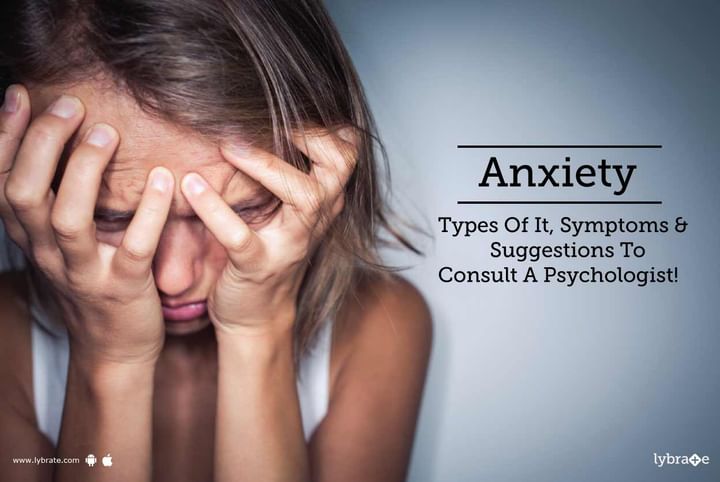Anxiety - Types Of It, Symptoms & Suggestions To Consult A Psychologist!
Anxiety is defined as an emotion, characterized by a feeling of nervousness, worry, or unease about something with an uncertain outcome. Feeling anxious about something now and then is normal, and the feeling persists for a short duration. However, for some people, these feelings may become more than just a stressful day at work or passing worries. It may take weeks, months, or years for your anxiety to go away.
Researchers and doctors believe that anxiety stems from a number of factors including one’s genes, environmental stress, and changes in the circuits of the brain. If not paid heed to, the condition may deteriorate and the person is likely to suffer from anxiety disorders.
Type of Anxiety Disorders:
The various types of anxiety disorders include –
- Agoraphobia- People usually have a fear of certain situations or places that make them feel embarrassed, powerless, or trapped.
- Generalized Anxiety Disorder or GAD- People encounter excessive worry and constant anxiety about ordinary events or activities.
- Obsessive Compulsive Disorder or OCD- This refers to the continual experience of intrusive or unwanted thoughts/worries that cause anxiety. The person may be aware that the thoughts are insignificant, but they still look for ways to relieve their anxiety by engaging in certain behaviours or rituals – counting, washing their hands repeatedly, checking on things etc.
- Panic Disorder- This leads to sudden, repeated bouts of fear, terror, or severe anxiety that culminate in only a few minutes. Panic attacks may cause you to worry about the occurrence of a situation or avoid a previously occurred instance.
- Post Traumatic Stress Disorder or PTSD- This results from one’s failure to recover after witnessing or experiencing a terrifying event. A person with PTSD may experience flashbacks of the incident, disturbing dreams, or may find it difficult to relax.
- Social Anxiety Disorder- This refers to one’s fear of public embarrassments and negative judgement from others in society.
- Separation Anxiety Disorder- The disorder is characterized by extreme levels of anxiety following the separation from a place or a person that provides a sense of security.
- Selective Mutism- This type of anxiety disorder is very common in children. A child with selective mutism may be unable to open up or speak up in specific places or situations, despite being surrounded by familiar faces. For example, when a child refuses to talk in school despite having excellent communication skills.
Symptoms of Anxiety Disorders:
Anxiety symptoms vary from one person to another. Nevertheless, the body reacts to anxiety in a specific way – it goes into high alert looking for possible threats and activates your fight-or-flight response. Here are some of the common signs of anxiety –
- Restlessness, nervousness, tension
- A feeling of dread, panic, or danger
- Hyperventilation or rapid breathing
- Heavy/increased sweating
- Muscle twitching
- Lethargy and weakness
- Difficulty focusing on things happening around
- Gastrointestinal problems – constipation, diarrhoea, or gas
- Insomnia
- A strong urge to steer away from things that trigger your anxiety
- Chest pain/tightness
- Dizziness and nausea
When to See a Doctor:
It is not easy to tell whether anxiety is an outcome of just another bad day or a serious medical condition. Therefore, you should look out for the above signs from early on. You should visit a psychologist if you feel you are worrying a bit too much, to an extent where your day-to-day life is getting affected. He/she will suggest a few sessions of psychotherapy and cognitive behavioural therapy to help you cope with your anxiety attacks.
- Psychotherapy- It is a counselling procedure, which addresses one’s emotional response to mental illness. The therapist encourages you to talk about the situations or things that are causing the attacks to help you understand and deal with them.
- Cognitive Behavioural Therapy- The therapy teaches you to recognize and alter thought patterns or behaviours that are triggering panic and anxiety attacks.
It is best to consult a psychologist and turn to various therapy sessions instead of taking medications because the latter often have side effects on your overall health. Also, you may consider doing meditation/yoga to relieve stress and manage anxiety symptoms.



+1.svg)
